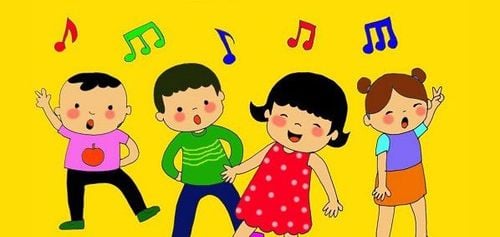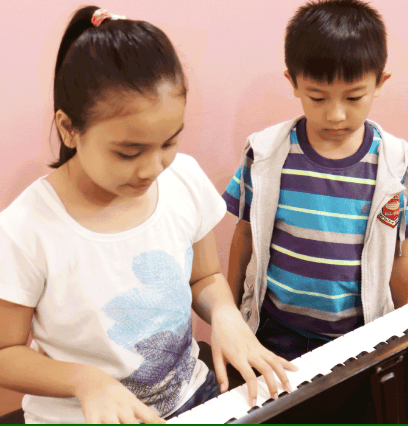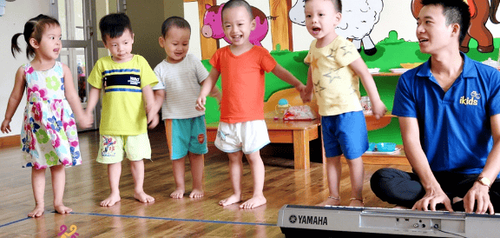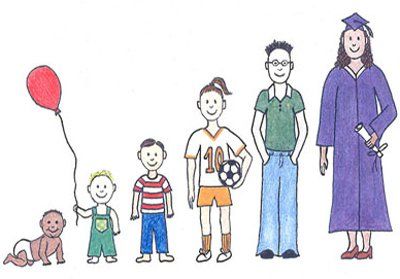This is an automatically translated article.
From the time of birth, parents often use music to soothe the child, to express love and joy, and to bond and interact with the child. Parents can build on these natural instincts by learning how music can impact a child's development, improve social skills, and benefit children of all ages.
1. The benefits of music to children's brain development
Singing and music play an important role in our culture. You will find music present in many aspects of our lives: theatre, television, movies, worship, holidays, celebrations, and government and military ceremonies. At home, music can become part of our home culture - a natural part of our daily lives.
A 2016 study at the University of Southern California's Institute of Brain and Creativity shows that musical experience in childhood can actually boost brain development, especially in the areas of receptivity. language and reading skills.
According to the National Association of Music Merchants (NAMM Foundation), learning to play an instrument can improve math performance and even increase SAT scores - which measure a student's physical, social, and logical thinking born.
But academic achievement is not the only benefit of music education and exposure. Music stimulates all areas of child development and school readiness skills, including intellectual, emotional, social, language, and overall literacy. It helps the body and mind work together.
Exposing children to music during early development helps children learn the sounds and meanings of words. Dancing to music helps children build motor skills while allowing them to practice expressing themselves. For children and adults, music enhances memory skills.
In addition to the benefits of development, or to put it simply: music gives us joy. Just thinking about listening to a good song in the car on a nice day is already pleasurable.

Âm nhạc giúp lợi cho sự phát triển của trẻ
Listening to a child play "Für Elise" will delight any parent, but the benefits of learning music go far beyond parenting pride. Many studies show that children who have learned to play an instrument perform better on tests related to literacy, verbal memory, math, and IQ than children who do not. do not study music.
Joseph Piro, associate professor in the Department of Curriculum and Instruction at Long Island University, said: “Brain regions that are stimulated until your child learns music can enhance brain regions involved in reading, math, and problem solving. problems and spatial reasoning.
A study published in the journal Psychology of Music compared a group of second graders who took piano lessons for three consecutive years with a group that did not take music lessons. At the end of the third year, the music-learners did significantly better than their non-music counterparts on a series of verbal and lexical sequence tests.
Laurel Trainor, professor of psychology, neuroscience and behavior at McMaster University and director of the McMaster Institute, says: “Music learning won't take your child from average to genius, but it does. can help your child learn better. Trainor says learning to play music actually has an effect on how the brain works when it comes to memory and attention.
Trainor points out that learning to play an instrument can be complicated for a small child. For example, if you are learning the violin, you have to figure out how to hold two different things properly, pay attention to the teacher, and try to reproduce the sound the teacher makes. Your brain is getting a real workout that will make it stronger and ready to learn other things.
Trainor adds that the benefits of music to your child go beyond test scores. “Music brings people together and makes you feel good,” she said.

Trí não của trẻ có thể phát triển nhờ việc tiếp xúc sớm với âm nhạc
2. Teaching music to children of all ages
Children of all ages express themselves through music. Even babies sway, bounce or move their hands to the music. Many preschoolers unconsciously compose songs and sing to themselves as they play. Primary school age children learn to sing together as a group and can learn to play an instrument. Older children dance to the music of their favorite band and use music to form friendships and share feelings.
Try these activities and games with your child to experience the joy and learning that music has to offer.
2.1. Teaching music to babies
Babies recognize the melody of a song long before they understand the words. Quiet background music can be soothing for babies, especially at bedtime. Loud background music can overstimulate babies by increasing the noise level of the room.
Sing short, simple songs for babies. Try saying a line or two about bathing, dressing, or eating to sing to them while you do these activities. You can also try to find more music learning activities for babies.
2.2. Teaching music to toddlers
Toddlers love to dance and move to music. The key to music for toddlers is repetition, which helps encourage language and memorization.
Unusual songs that make toddlers laugh. Try singing a familiar song and inserting an unusual word in place of the correct word, such as “Mary had a little spider” instead of a lamb. Let your child recreate the rhythm by clapping his hands or tapping on objects.

Dạy nhạc cho trẻ mới biết đi
2.3. Teaching music to preschoolers
Preschoolers love to sing just to be sung. They are not self-aware of their own abilities and most of them wish to have their voices heard. They like songs that repeat words and melodies, use rhythms with a certain beat, and ask them to do things.
Preschool children love kindergarten songs about familiar things like toys, animals, fun activities and people. They also enjoy playing meaningless rhymes with or without accompaniment.
2.4. Teaching music to school-age children
Most school-age children are intrigued by children's singles songs that involve counting, spelling, or memorizing a sequence of events. School-age children begin to show likes and dislikes to different types of music. They may express an interest in music education, such as music lessons for children.

Vai trò quan trọng của âm nhạc đối với trẻ em ở độ tuổi đi học
2.5. Teaching music to teenagers
Teens can use music to form friendships and to make a difference with parents and younger children. They often want to hang out and listen to music after school with a group of friends. Remember the days of basement and garage bands? Teenagers often have a hobby of learning music or playing in a band.
There is no downside to bringing kids and music together through fun activities. We can enjoy the benefits of music from the moment we are born.
Although a good Mozart may not increase our brain power, it is very enjoyable. From the pure joy of hearing soothing sounds and rhythmic harmonies, to acquiring new languages and social skills, music can enliven and enrich the lives of children and adults. Take care them.
In addition, in order to help children develop comprehensively, parents should pay attention to nutrition to improve children's resistance. At the same time, add supporting foods containing lysine, essential micro-minerals and vitamins such as zinc, chromium, selenium, B vitamins,... snacks and less digestive problems.
Parents can learn more:
Why do you need to supplement Lysine for your baby?
The role of zinc - Guidelines for reasonable zinc supplementation
Please visit the website Vinmec.com regularly and update useful information to take care of your baby and family.
Articles refer to sources: babycenter.com, brighthorizons.com, trainorlab.mcmaster.ca, time.com













